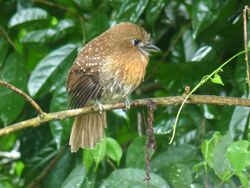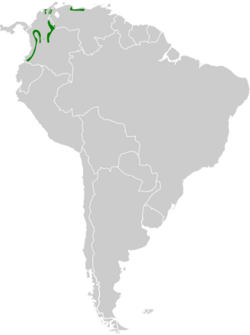Biology:Moustached puffbird
| Moustached puffbird | |
|---|---|

| |
| In Manizales, Caldas, Colombia | |
| Scientific classification | |
| Kingdom: | Animalia |
| Phylum: | Chordata |
| Class: | Aves |
| Order: | Piciformes |
| Family: | Bucconidae |
| Genus: | Malacoptila |
| Species: | M. mystacalis
|
| Binomial name | |
| Malacoptila mystacalis (Lafresnaye, 1850)
| |

| |
The moustached puffbird (Malacoptila mystacalis) is a species of near-passerine bird in the family Bucconidae, the puffbirds, nunlets, and nunbirds. It is one of seven species in the genus Malacoptila. It is found in Colombia, Ecuador, and Venezuela.[1]
Taxonomy and systematics
The moustached puffbird is monotypic, though the population in southwestern Colombia might merit treatment as a subspecies. It is thought to form a superspecies with the white-whiskered puffbird (M. panamensis) and black-streaked puffbird (M. fulvogularis).[1][2][3]
Description
The moustached puffbird is 20 to 23 cm (7.9 to 9.1 in) long and weighs 47 to 50 g (1.7 to 1.8 oz). Unlike most puffbirds, the male and female have different plumages. Both sexes have bristles around the base of the large bill, and white "whiskers", which are actually tufts of feathers. The adult male is drab brown above with white to buffy spots on the back and the wing coverts. Its tail is brown with small buffy markings. Its lores and a half ring behind the eye are white. The chin, throat, and breast are rufous with indistinct darker streaks on the last. The belly is white and the flanks dull brown with whitish bars and streaks. The bill is black, the eye red, and the feet silvery bluish. The adult female is grayer above with heavier buff markings and has a paler breast with heavier streaks. Immatures are darker with less obvious light markings and is less rufous on the breast.[3]
Distribution and habitat
The moustached puffbird is found in the Andes, in northern and northwestern Venezuela through Colombia and slightly into northern Ecuador. It is primarily a bird of the undergrowth of humid and wet forests, though it also occurs along the edges of forest and in open woodland. It usually stays within 6 m (20 ft) of the ground. In elevation it ranges from 350 to 2,100 m (1,100 to 6,900 ft).[3][4]
Behavior
Feeding
No information has been published about the moustached puffbird's feeding behavior or diet.[3]
Breeding
The moustached puffbird appears to breed between May and August in Venezuela and February to September in Colombia. It nests in a hole excavated in an earth bank, but no other details of its breeding phenology are known.[3]
Vocalization
The moustached puffbird's song is a "[h]igh thin peeping" like that of other puffbirds in its genus.[3]
Status
The IUCN has assessed the moustached puffbird as being of Least Concern. Though its population has not been determined, it is thought to be stable. No immediate threats have been identified.[5]
References
- ↑ 1.0 1.1 Gill, F.; Donsker, D.; Rasmussen, P. (July 2021). "IOC World Bird List (v 11.2)". https://www.worldbirdnames.org/.
- ↑ Remsen, J. V., Jr., J. I. Areta, E. Bonaccorso, S. Claramunt, A. Jaramillo, D. F. Lane, J. F. Pacheco, M. B. Robbins, F. G. Stiles, and K. J. Zimmer. Version 24 August 2021. A classification of the bird species of South America. American Ornithological Society. https://www.museum.lsu.edu/~Remsen/SACCBaseline.htm retrieved August 24, 2021
- ↑ 3.0 3.1 3.2 3.3 3.4 3.5 Rasmussen, P. C. and N. Collar (2020). Moustached Puffbird (Malacoptila mystacalis), version 1.0. In Birds of the World (J. del Hoyo, A. Elliott, J. Sargatal, D. A. Christie, and E. de Juana, Editors). Cornell Lab of Ornithology, Ithaca, NY, USA. https://doi.org/10.2173/bow.moupuf1.01 retrieved November 9, 2021
- ↑ Remsen, J. V., Jr., J. I. Areta, E. Bonaccorso, S. Claramunt, A. Jaramillo, D. F. Lane, J. F. Pacheco, M. B. Robbins, F. G. Stiles, and K. J. Zimmer. Version 24 August 2021. Species Lists of Birds for South American Countries and Territories. https://www.museum.lsu.edu/~Remsen/SACCCountryLists.htm retrieved August 24, 2021
- ↑ Cite error: Invalid
<ref>tag; no text was provided for refs namedIUCN
External links
- Moustached puffbird photo gallery at VIREO (Drexel University)
Wikidata ☰ Q1240293 entry
 |

